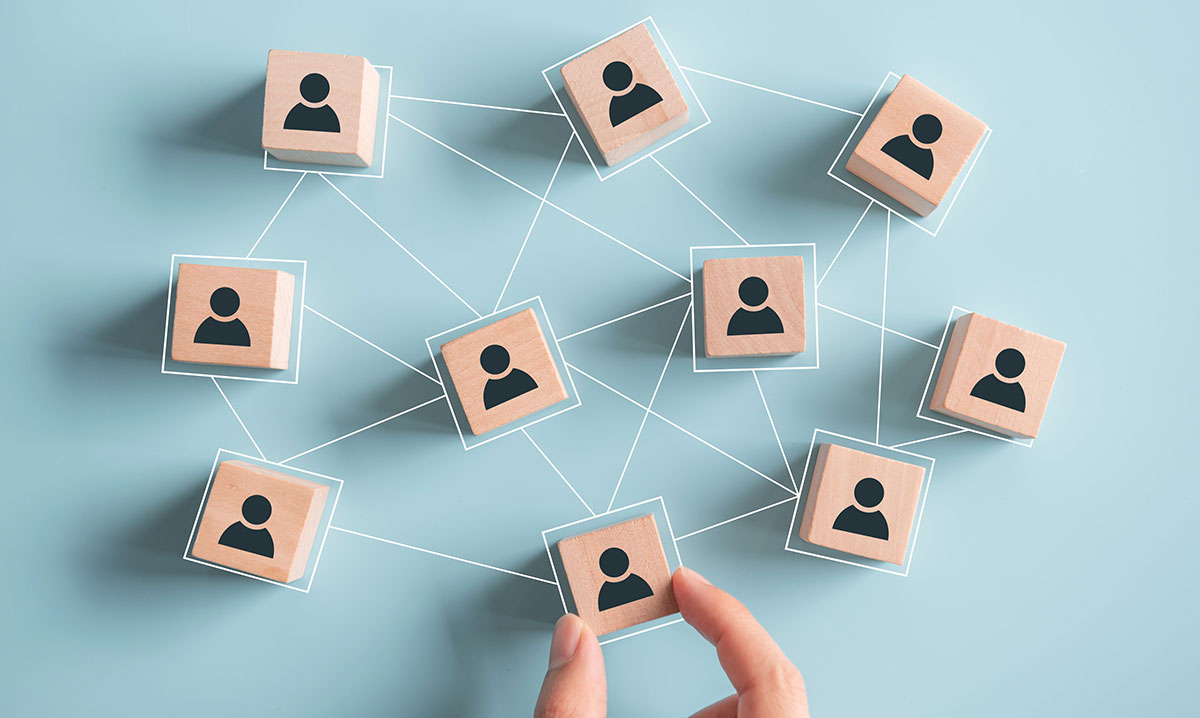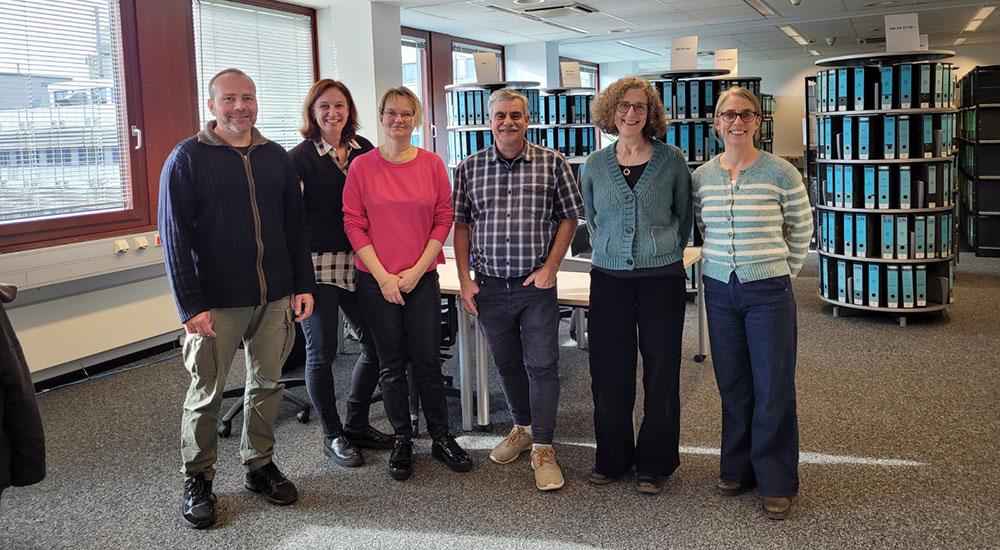
Overview National cooperation projects and User Advisory Council on Patents / Utility Models
Different organisations, one common goal: The DPMA fosters the expansion of a strong and competent network for the protection of intellectual property. Our partners are important agents in the field of commercial IP rights, such as chambers of industry and commerce, industrial trade associations, innovation-promoting universities, but also customs. In cooperation with the patent information centres, we provide local expert support, in particular to small and medium-sized enterprises (SME).

The patent information centres are present at 19 locations all over Germany and are an essential part of this network. A cooperation partner of the DPMA for many years, they have become an irreplaceable local point of contact for our customers.

Locations of the German Patent and Trade Mark Office
One of the main tasks of the patent information centres is the support of SME. Counselling for business founders and research institutions regarding all questions around IP protection is also part of their services on offer. Not only do they provide exhaustive information on commercial legal protection, the patent information centres also show the way from an idea to an IP right and they offer support in avoiding infringements of the rights of third parties. They propose tailor-made solutions for the customers and take a global look at their issues. At the same time, they guarantee strict confidentiality and secrecy.
In order to fulfil those tasks, the patent information centres offer different types of services: Support of the customers’ own research is one of them. Other services in the broad range of offers are commissioned research and counselling concerning the strategic management of IP rights, the enforcement of IP rights and the fight against product piracy.
Furthermore, they organise free-of-charge initial counselling for inventors that is carried out by the patent attorney community or the Chamber of Patent Attorneys.
Regular events, trainings and workshops on different topics concerning commercial legal protection, often organised in cooperation with the DPMA or local institutions such as the chambers of industry and commerce, complete the broad range of services offered by the patent information centres.
All patent information centres were able to open their doors to visitors again in the course of the year 2022. While the now well-expanded offer in online services — such as virtual counselling options, webinars or web-based research — is met with great response, confidential private counselling as well as on-site research with guidance by staff of the patent information centres became, once again, popular offers with direct costumer contact once the patent information centres were opened. Visitors also took up participation in face-to-face events again.
Further information on our national cooperation partners can be found on our website.
The yearly patent information centres conference, a well-established element of cooperation between the DPMA and the patent information centres, took place in Munich in December 2022.
Among the matters covered were current affairs, but also the establishment of common marketing activities. Experience and examples for best practice in the area were exchanged in a social media workshop. Colleagues from the DPMA in Jena gave a talk about current developments in design protection, news concerning the Locarno classification and new ways to research designs in databases.
The patent information centres continue to be neutral service providers and important cooperation partners of the DPMA. They make a decisive contribution to sustainably strengthening the awareness of intellectual property in the public, the economy and science.
The User Advisory Council on Patents and Utility Models at the DPMA has now successfully completed the first half of its second term of office.
The prolongation of the term of office from two to four years has contributed to a positive development: Even though, during this prolongation of the term of office, the DPMA User Advisory Council convened in online meetings only, all participants have managed to get to know each other better and to intensify their exchange of views and experiences.
Time and again, the feedback provided by the members of the User Advisory Council yields valuable new findings about our customers’ needs and provides direct insights into our users’ practical experience. The members of the advisory body decide on the subjects to focus on, which fortunately gives rise to discussions going beyond the classic main focus areas, such as patent quality or examination procedures. For instance, the DPMA User Advisory Council has decided unanimously that efforts across portfolios should be made in order to establish a national innovation strategy. A national IP strategy across portfolios would make an essential contribution to creating more awareness of topics concerning the protection of intellectual property among the general public and to highlighting the opportunities stemming from the strategic use of commercial IP rights to guarantee investments in research and development.
The evaluation of the DPMA User Advisory Council, scheduled for the second term of office, will come with a detailed interim balance. The evaluation is also supposed to examine the direction and functioning of the body and, where appropriate, show ways of optimisation.
The DPMA would like to thank all members and stand-ins for their great commitment and is looking forward to upcoming meetings with delight and interest.

Interview: Dr Susanne Ruffert, head of PNZ Aachen, on services “We prepare business founders for their journey”
Dr Susanne Ruffert, Head of the Patent and Standards Information Centre (PNZ) in Aachen, talks about new forms of European cooperation, fundamental work for business decisions and future target groups for her Patent Information Centre (PIZ).

You are at a location where Europe is particularly palpable. How European is the PNZ Aachen?
We are passionate Europeans at heart! We put the European spirit into practice with our cooperation with the Patent Information Centres in the European PATLIB Network. For a few years now, we have been active as speakers at conferences and trainings of the European Patent Office (EPO). In addition, I have been representing the German-speaking Patent Information Centres in the PATLIB committee, EPO’s advisory board, since the fall of 2020. I had the chance to accompany the implementation of the project PATLIB 2.0, initiated in 2019, from a front row seat in this office. The project, which ends in May 2023, as does my term of office in the committee, has taken the cooperation of the European Centres with each other and with the EPO to a new level. I am certain that the momentum created by PATLIB 2.0 will have a lasting effect and I am excited to see the further development.
In public relations, what is your strategy to gain even more public awareness and work even more efficiently for the protection of intellectual property?
Surveys among our customers have shown that 30 percent of the respondents come to us via the DPMA. That shows how important the cooperation with the DPMA is! One third finds us via the internet and no less than 20 percent thanks to a tip from our university staff.
Your good reputation brings you more customer contacts?
That is one way to put it. We try to use our direct contacts. The PNZ team is well connected in the Aachen business founders’ scene due to our work as experts at the AC2 competition for business foundation and growth of the Cities Region (StädteRegion Aachen). But we also cooperate closely with other institutions.
We regularly hold patent consultation days in cooperation with AGIT, the Aachen association for innovation and technology transfer, and participate in information events on the subject of commercial legal protection. In addition, we have been organising events on the occasion of the World IP Day with AGIT, the chamber of commerce and industry and the chamber of crafts Aachen for almost ten years. This year, we were represented once again, this time with the subject women and IP. We are delighted that we are now back to face-to-face events. Even though we were able to reach many participants with virtual formats, the personal, informal exchange is particularly important — and that works best over a drink. In a nutshell, the strategy for our public relations is: network as much as possible and stay dynamic!
You are part of RWTH Aachen University, one of the most important technical universities in the country. What role do technology transfers and spin-offs play in your work?
Indeed, the region of Aachen is an ideal environment for foundations of technology-based businesses, with its local universities as well as numerous innovative companies and research institutions. At the RWTH, technology transfer and entrepreneurship are advanced by RWTH Innovation GmbH. The PNZ is organisationally detached and therefore not engaged in implementing research results in the market. Our services and our activity in this regard start sooner. What we do is create awareness of and provide information about the protection of intellectual property and carry out the corresponding IP researches which enhance legal security. With our services, we prepare researchers and business founders for their future endeavours, which usually lead to technology transfers and to the patent attorney. We create the basis for well-founded business decisions by informing our customers about the opportunities and risks of IP protection. This task comes natural to us, as we are neutral towards all projects.
How does the DPMA support you?
During the development of the German patent information centres (PIZ) from consultation sites to comprehensive information service providers for technology transfer, the DPMA has been and still is a reliable driving power, not only for us, but for the entire PIZ network. On the one hand, we benefit from the many training events organised by the DPMA for the PIZ. On the other hand, the good cooperation between the PIZ, consolidated by the regular meetings, is precious.
The DPMA supports this, for instance, by hosting the yearly PIZ conference. As I have said before, we also benefit from the DPMA in a very tangible manner, because many requests reach us via the DPMA. And finally, the expertise of the speakers from the DPMA at our workshops and information events are a great offer! They make valuable contributions to our events with convincing technical knowledge and interesting presentations and are met with great response in the region, time and again.
What are the focus points and projects that you want to take on in the year to come?
This year, we are working on developing new information formats or revising existing formats. For example, we are planning to also hold our two-day workshop for PhD students and postdocs in a hybrid format in order to offer participants a maximum of flexibility. Furthermore, we are planning on reworking our website and, in this context, we intend to present our series “Patent of the month” in a more appealing way, or rather, make older posts available in bundles. We are also excited about plans for cooperation of the central library of the Jülich Research Centre and the university library of the RWTH, which the PNZ is part of. We see potential synergies in the area of “Information transfer and counselling”. And finally, we would like to focus more on pupils, who are very important to the RWTH. That way, we can create awareness of intellectual property among future researchers at an early stage. A similar offer is already being implemented at a large scale in Poland. That is another example of how we can learn and benefit from each other in Europe.